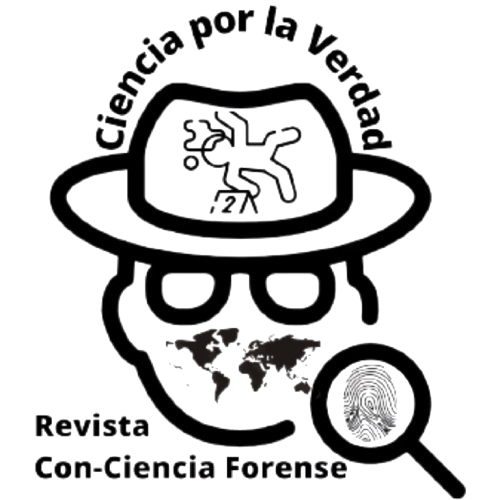Author Guidelines
Author Guideline
The journal Con-Ciencia Forense publishes various academic and scientific works in the field of criminalistics, forensic sciences, and related disciplines. Below are the guidelines for manuscript submission and editorial standards.
I. Types of Publications
- Original Articles
Manuscripts presenting original research results in Criminal Investigation, Forensic Sciences, Criminalistics, Criminology, Law, and Related Disciplines. Rigorous analysis is required, with appropriate theoretical and methodological foundation.
- Review Articles
Studies that analyze and synthesize the state of the art on a specific topic within the forensic field. They must include critical discussion and provide new perspectives on the topic.
- Forensic Cases
Detailed investigations of specific cases that offer significant contributions to forensic knowledge and its application in practice.
- Expert Reports
Brief publications on advances, discoveries, or technological innovations applied to criminal investigation.
II. Editorial Process and Policies
- Selection and Review
All manuscripts undergo a double-blind peer review process.
The journal reserves the right to reject works that do not meet quality and relevance criteria.
Originality and scientific rigor are required.
- Author Contribution Declaration
The CRediT Taxonomy is adopted to recognize each author's contribution. Roles include:
Conceptualization: Development of ideas, objectives, and research approach.
Methodology: Design and validation of the applied methodology.
Software: Programming, software development, or implementation of codes for analysis.
Validation: Verification of results obtained through repeated analysis or alternative methods.
Formal Analysis: Application of statistical, mathematical, or computational techniques to interpret data.
Investigation: Conducting experimental work, data collection, or evidence gathering.
Resources: Provision of materials, reagents, instruments, or access to infrastructure.
Data Curation: Management, maintenance, and preservation of the data used.
Writing – Original Draft: Preparation of the initial version of the manuscript.
Writing – Review & Editing: Critical review and substantial revision of the text, incorporating significant improvements.
Visualization: Creation of figures, tables, or graphic elements that present the data.
Supervision: Direction and responsible leadership of the research team.
Project Administration: Management of activities related to the organization and execution of the project.
Funding Acquisition: Obtaining funding for the research.
Each author must declare their contributions at the time of manuscript submission.
3. Resolution of Authorship Conflicts
Any dispute will be resolved by the Editorial Committee in accordance with the guidelines of the Committee on Publication Ethics (COPE).
Ciencia por la Verdad S.A.S reaffirms its commitment to implementing the CRediT standard to ensure that the contributions of all authors are fairly valued and recognized.
4. Copyright and Usage License
Works published in Con-Ciencia Forense are under the Creative Commons Attribution-NonCommercial-ShareAlike 4.0 International License (CC BY-NC-SA 4.0). Authors partially retain copyright, granting the journal the right to reproduce and distribute in print and digital formats.
III. Thematic Areas
Publications in Con-Ciencia Forense cover, among others, the following areas:
Criminalistics: Articles related to techniques, methodologies, and advances in the collection, analysis, and interpretation of evidence within judicial investigations are accepted. Studies on innovations in crime scene investigation, dactyloscopy, document examination, forensic ballistics, genealogy, cheiloscopy, palynology, rugoscopy, poroscopy, forensic chemistry, and other related disciplines are highly valued.
Criminology: Studies analyzing criminal behavior from both theoretical and applied perspectives are welcomed. This includes research on criminogenic factors, criminal psychology, crime prevention, criminal profiling, victimology, and organized crime, as well as studies on security policies and social reintegration. Contributions on Educational Criminology and Corporate Criminology are also encouraged.
Law: Articles in this area should address the regulatory and legal framework related to criminalistics, forensic sciences, and criminal investigation. Analyses of criminal law, criminal procedure law, human rights, restorative justice, forensic law, and comparative studies on the application of legal norms in different judicial systems are particularly valued. Articles on other branches of law that are related to our research lines may also be submitted.
Forensic Sciences: Research on scientific disciplines applied to crime resolution and the judicial system is published. This includes studies in forensic medicine, forensic odontology, forensic anthropology, forensic toxicology, forensic genetics, forensic entomology, and technological advancements in evidence analysis.
Criminal Investigation:
Works on techniques and strategies for crime resolution, from police intelligence to criminal pattern analysis, are accepted. Studies on interview and interrogation methods, crime scene reconstruction, criminal network analysis, transnational crime, and cybercrime are also included.
Authors must ensure that their submissions are original, adhere to methodological rigor, and contribute novel or applied knowledge to the field.
IV. Manuscript Submission Checklist
Before submission, ensure compliance with the following requirements:
The manuscript is original and unpublished.
It adheres to the journal's guidelines regarding structure and format.
References have been verified.
Figures, tables, and equations are correctly numbered and cited in the text.
Permissions for publishing images and other materials have been obtained.
V. Privacy Statement
We guarantee that any personal information provided, such as names and email addresses, will be used exclusively for the stated purposes, such as distributing updates, newsletters, or communications related to our publications.
We are committed to not sharing, selling, or transferring this information to third parties under any circumstances. If you wish to update your data or unsubscribe from our communications, you may do so at any time by contacting us directly.
Your privacy is our priority, and we work to protect it with the highest standards of security and confidentiality.






